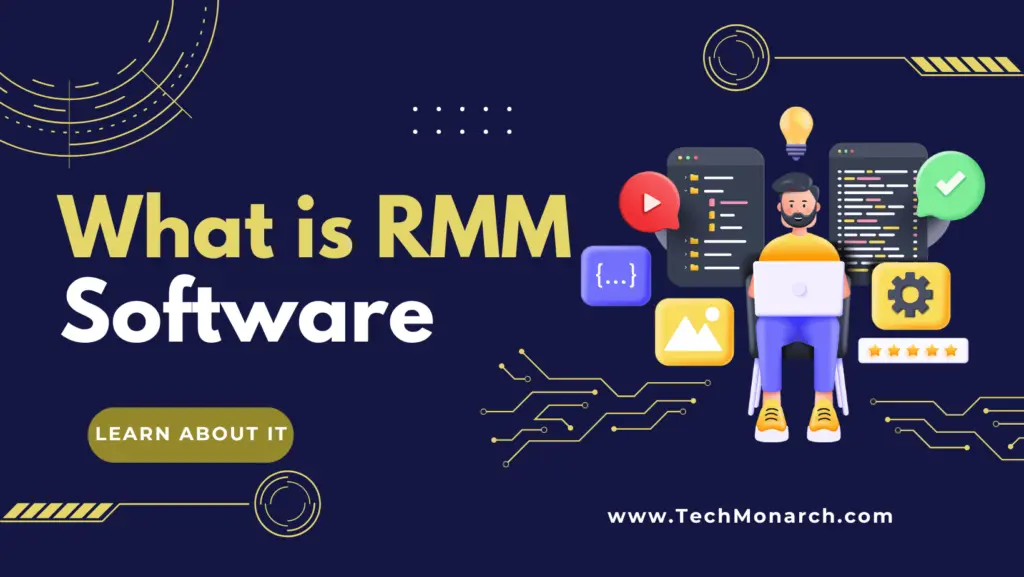
What is RMM Software: In a hyper-connected world, the ability to monitor and manage IT infrastructures remotely has become indispensable for businesses of all sizes.
Remote Monitoring and Management solutions enable organizations to manage their clients’ IT systems even when they are not physically there, ensuring the efficiency of the system, protection against cyber threats, and continuity of operations.
In this article, we’re providing readers with a deep understanding of what is RMM software, what are its main features and benefits, as well as some important recommendations about how to recognize the best RMM solutions out there.
What Is RMM Software?
RMM software is a program that enables MSPs (Management Service Providers) and IT service providers to monitor and manage their clients’ IT systems remotely.
An RMM software solution provides It professionals with a suite of functionalities that allow them to monitor and intervene in servers, workstations, network infrastructures, and more, regardless of their physical location.
Even though RMM software can be used to fix issues remotely – without sending a technician on-site – its primary objective is always monitoring and maintenance.
When potential issues are identified in advance, the organization is ensured with continuity of operations, cost reduction, and resource optimization.
Key Features Of RMM Solutions
How does RMM software perform remote monitoring and control over IT systems?
- Remote Monitoring: It provides real-time metrics, parameters, and data to monitor networks, devices, servers, workstations, and more. It also collects and analyzes data giving the administrator a tool to identify potential issues proactively.
- Alerts and Notifications: RMM software generated alerts based on predefined events or thresholds, such as hardware failures, compliance violations, security breaches, and more.
- Automation: RMM software allows users to set routines to automate tasks like antivirus scans, updates, backups, and others.
- Patch Management: RMM software allows administrators to schedule and deploy patches for operating systems, applications, and firmware, both manually and automatically.
- Security: RMM solutions include features that help protect systems from potential threats like data loss or cyber-attacks. These features are antivirus and antimalware, firewall management, vulnerability scanning, and more.
- Compliance: RMM software is also a tool that facilitates the process of maintaining systems compliant with regulations. Processes can be done automatically reducing potential human error and costs.
- Report: Last but not least, RMM solutions create reports, useful to keep track of performances, and actions, and to share data with clients and other stakeholders.
Benefits Of RMM For Online And IT-Based Businesses
1.Proactive approach
Traditional IT management is “reactional”. When an issue occurs, the company contacts its IT service provider that sends a technician to fix the problem.
With RMM, instead, IT management becomes proactive, meaning that it is focused on preventing problems through continuous monitoring and maintenance. With this approach, businesses can avoid downtimes and maintain IT management-related costs stable over time.
2.Enhanced security
Any organization that relies on IT infrastructure needs to deal with cyber security.
When speaking of cyber security, many wrongly tend to limit the problem to threats like malware and cyber-attacks. However, any IT infrastructure is also subject to other types of risks: data losses, data leaks, and more… Imagine being a medium-sized e-commerce and having all your clients’ personal data (including credit card numbers) exposed because of a security problem.
Businesses of all sizes must prevent these issues and guarantee their customers’ privacy, other than the security of their own systems.
RMM ensures that these aspects are prioritized with continuous monitoring and updates.
3.Optimization of resources and costs
RMM provides businesses with opportunities to reduce costs in two main ways:
- By preventing issues instead of fixing them once they’ve occurred, it allows businesses to save money on repair expenses. It also avoids money losses due to malfunctions and downtimes.
- Because RMM allows IT professionals to intervene in IT infrastructures remotely, IT management costs are reduced. A technician that once a month comes to the facility to run controls and updates has certainly a higher cost than one that can keep a constant eye on the business IT from their location and doesn’t need to come on-site for updates.
Conclusion
RMM software provide the best solutions to optimize IT management. Every business that deals with IT infrastructures of any kind should rely on an MSP that deploys RMM solutions to guarantee continues monitoring and updates, defense against threats, and continuity of operations.
Recent Posts
- RMM vs. AIOps: When to Integrate AI and Automate Level 1 & 2 Tickets
- Are We Ready for Fully Autonomous NOCs? The Human Element in an AI WorldThe Hidden Costs of Over-Automation in Managed IT
- How White Label Providers Are Quietly Powering the MSP Revolution
- How White Label Providers Are Quietly Powering the MSP Revolution
- Why SLOs (Service Level Objectives) Are More Reliable Than SLAs in NOC Performance
Recent Comments
- ISO 27001 Certification Audit on The Impact of Quantum Computing on Cybersecurity: Preparing for the Future
